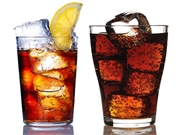Greater decrease in HDL, increase in triglycerides seen for regular versus low consumption level
WEDNESDAY, Feb. 26, 2020 (HealthDay News) — Intake of sugar-sweetened beverages (SSB) is associated with adverse changes in high-density lipoprotein cholesterol and triglyceride concentrations, according to a study published online Feb. 26 in the Journal of the American Heart Association.
Danielle E. Haslem, Ph.D., from Tufts University in Boston, and colleagues measured fasting plasma lipoprotein concentrations in the Framingham Offspring Study and Generation Three cohorts (3,146 and 3,584 individuals, respectively). Food frequency questionnaires were used to estimate beverage intakes, which were grouped into five categories of intake.
The researchers observed a greater mean decrease in high-density lipoprotein cholesterol and an increase in triglyceride concentrations for regular (more than one serving per day) versus low (less than one serving per month) SSB consumption. Compared with low consumers, long-term regular SSB consumers had a higher incidence of high triglycerides (hazard ratio, 1.52). Compared with low consumers, regular low-calorie sweetened beverage consumers had an elevated incidence of non-high-density lipoprotein cholesterol and low-density lipoprotein cholesterol concentrations (hazard ratios, 1.40 and 1.27, respectively); however, there was no association seen for cumulative average intakes of low-calorie sweetened beverages with changes in non-high-density lipoprotein cholesterol, low-density lipoprotein cholesterol concentrations, or incident dyslipidemias.
“These findings are consistent with current recommendations to limit SSB consumption and emphasize the need for further research to inform recommendations related to low-calorie sweetened beverage and fruit juice consumption,” the authors write.
Copyright © 2020 HealthDay. All rights reserved.








